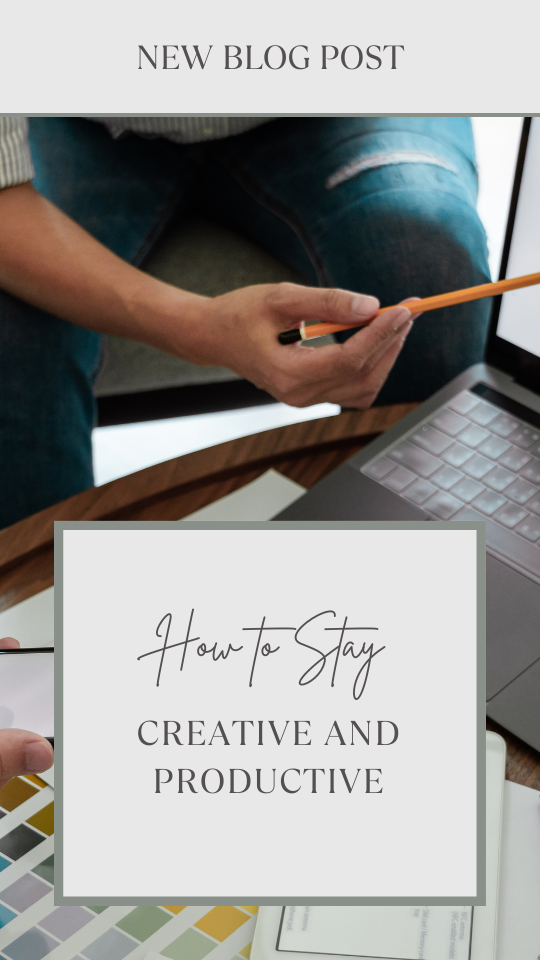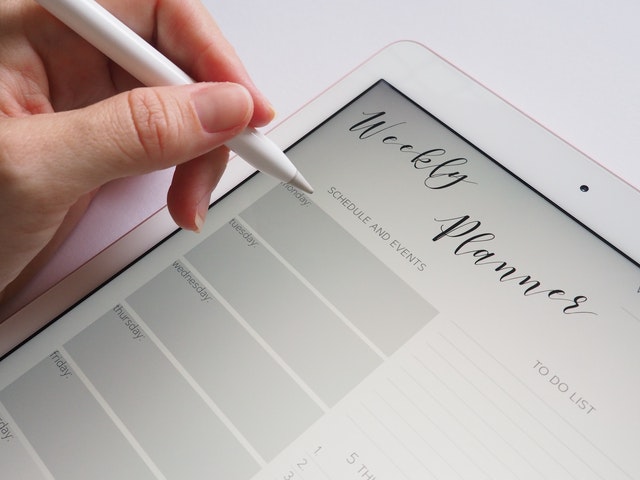
How to Stay Creative and Productive
Many of us find it hard to stay productive, let alone keep our creative level where we’re satisfied with. Trying to do both can really wear a person out; not to mention trying to juggle everything else that we have going on. Since everyone is different, I can’t say everything here will help you in your endeavors, but it could help some and that’s what matters. As with all things, let’s start with a plan.
Plan
In order to plan, you have to be intentional about what you are going to do and where you want to be. Then putting those down on paper, and then fleshing out exactly what needs to be done in mini action steps.
Define Productivity and Creativity
For a starting exercise, let’s define what being productive and creative are. It could mean something completely different from person to person. Until you know exactly what these two words mean to you, you’ll be stuck in the same pattern that you’ve always been in. You trying to figure out exactly what you want needs to be done and how to do it.
Productive could mean progress. It could mean something a bit more specific like checking off your to do lists, or it could mean something more meaningful. Such as overcoming obstacles to reach our destination. Whatever productivity means to you, write it down.
The same goes with creative. It could mean the spark that gives your ideas life, the flame that ignites your imagination, or the small pieces of a greater whole. Being creative is what gets you through to the destination of your journey; whether that journey is creating a new product, writing a book, typing a blog post, or something bigger.
Whatever you decide these two word mean to you, write them down and keep them somewhere you can see them regularly. Keep these in mind as you complete your projects.
Establish Your Goals
If you haven’t done this already (now that it’s the end of January) don’t worry. Your goals are important and provide the opportunity to do something great. It’s the starting point to all your projects, ambitions, and aspirations.
Write down these goals as a starting point, then move onto the next heading.
Get Writing
Create a path for those goals to take, the mini-steps and any obstacles you may face while journeying to your destination. This is where you write down every idea you have for your project no matter how large or small. This way you have all of your ideas handy and whether you use them all or not, you will have them for when you do need them.
Routine
Creating and sticking to a routine/habits will help keep you on track, reduce stress and form a better groove for your life. Who doesn’t want that?

Dedication
When you decide you are going to do something there is a level of determination behind it. Where that level is in relation to the project can tell you whether you are going to have the gumption to complete it or not.
Some start a a project for fun and at times that is all you need to finish it. For the joy it brings or the fact that it’s something you love to do, without consequence or negative repercussion. Others start it because of a deeper reasoning.
No matter the reason, you dedicate your time and energy to the project. Time and energy you may need to plan out depending on how your schedule is. Decide what times you have available to work, relax, and take care of yourself. Putting this time into your schedule and planner will provide, not only a reminder, but will also keep you on track with your goals.
Accountability
If you are the type of person that can work and not be bothered with others, well, more power to you. Others, like myself, need that extra push when having accountability. Whether that is tracking your progress on paper, or having an accountability partner that you talk to regularly; find ways to hold yourself accountable to your work.
No one is going to be more disappointed that you for not reaching the goals you set and the productivity you desire than you. Be sure to make yourself proud of what you’ve accomplished and what you will accomplish.
Distractions
These little buggers are such a pain in the butt. They pop up everywhere and without notice, distracting us from what is most important during the time we’ve set. It could be as small as surfing the net or a friendly phone call. These are the things that could potential keep us from getting anything done at all if we let them.
Family, friends, house work – these can all be distractions and ones we need to reduce, limit or create a plan for, when they slide into our space and work time. This is also where planning can come in handy for the house work at least.
Family and friends are a bit different in their handling. If your kids are like mine, they like to come in talking about whatever it is they found on the net or looked up. Try to find unique and creative ways in guiding them from your work time. Have a discussion board outside your room with spaces for them to leave topics. When you are done with work, allow some time during dinner or one on one to discuss those topics they were going to interrupt you for. Sometimes kids just want to talk to someone about something they like, give them that chance.
If you make sure each has a little bit of your time, they will give you the time you need for your projects and work.
Break/Self Care
I know you’ve heard this from nearly everyone, but it’s extremely important to take care of yourself when you’re working on anything for longer periods of time.
Taking smaller breaks in between will help you keep your mind focused on the task at hand. Even if it’s just stretching, walking around the room, or going to the bathroom. Small breaks are needed to relieve stress, reduce fatigue and provide a bit of exercise for your legs when getting up. Now, I wouldn’t consider this exercise in the larger routine sense, but getting up and walking around a bit will give your legs and body a chance to stretch and move.
Keep plenty of water and even healthy snacks nearby. One thing I wish I had in my office was a mini-fridge for that purpose. If I don’t have to leave my office, I won’t get distracted and I’ll have healthy snacks and water nearby when I need it.
When you need a larger break, take it. Overworking yourself or even trying to continue when your body an mind aren’t in it are not going to get you anywhere. Take a break when you need one, clear your head, relax and then get back into it. You don’t want to be gone so long that you don’t remember or loose track of your project, but take that break to refresh your mind and body.
You never know when something will come to you. A lot of the time it will come to you when you least expect it and when you’re not thinking about it. So, it’s a win-win!
If you need a break, but are the type to work on more than one project at a time. Perhaps switching could give you the break that you need. You may be working on that second project when an epiphany for the first could occur.
Give Yourself a Reward System
Now, I know some don’t like the thought of a reward system and that’s perfectly okay. Some work better when they have an incentive to get too and that great too.
The only problem is that those who do choose to do a reward system will choose something that doesn’t benefit them and their goals. Usually it’s some sort of treat, which when used for larger milestones, I think is great. For smaller ones though, I feel it would be more beneficial if the rewards correlated with your goals.
Rewards like, reading your favorite author, learning a new skill, or even providing yourself some self care time with a bubble bath would help keep you on the right track. Your goals themselves are your reward for your hard work, but could also be your reward. If you took all the steps to create an online course, marketing and launching it. The profit from that would be it’s own reward.
The way you think about rewards, what they are and how you use them should be beneficial to you and your goals. Don’t just think of things you like, such as chocolate or a trip to Starbucks. If you want to use those for your larger milestones, go ahead. Larger milestones tend to be further spread out, so you wouldn’t indulge more than you should.
Creative Toolbox
Every creative has a toolbox of items they refer to regularly for inspiration, assistance, and more. Below is a list of things to consider when creating your own toolbox. You what you wish, it’s there for you.
- Mind Map
- Vision board
- Outlines/Lists
- Bullet Journal
- Random Activities List
- Plants – Can promote health and happiness. Not to mention they filter the air for you.
- Pinterest/Instagram
Final Thoughts
Staying organized and productive as a creative is really the same as any other group. Make a plan, create steps to accomplish that plan, reduce distractions, take breaks, self care and find ways to reward your milestones. Use your creativity to your advantage to work through things, create new things, and accomplish what you’ve set out to do. You can definitely accomplish your goals if you have the right tools. I wish you luck in all your endeavors.




